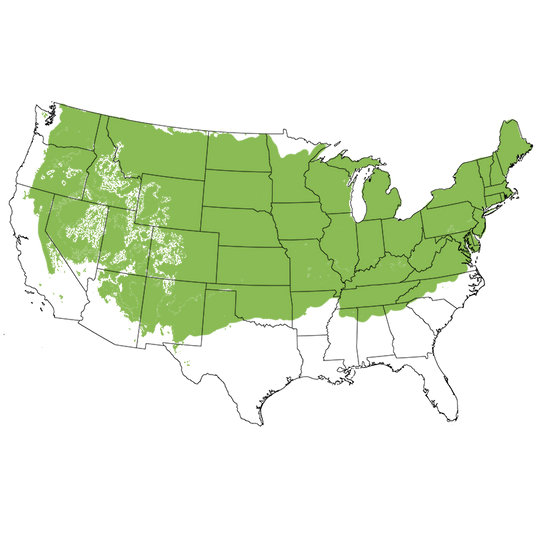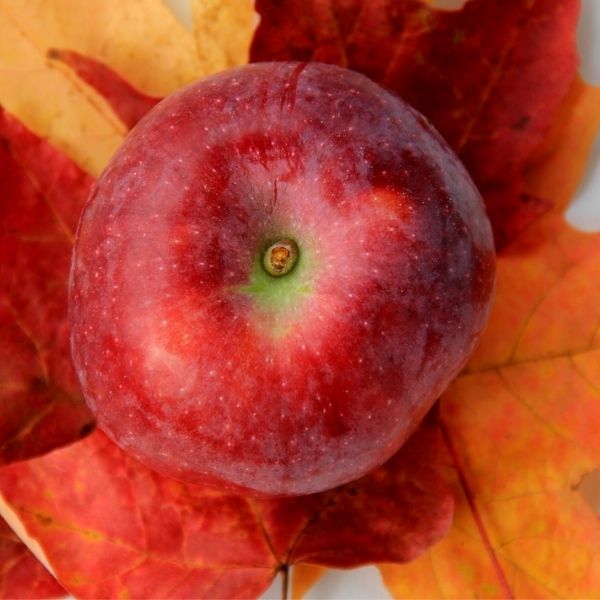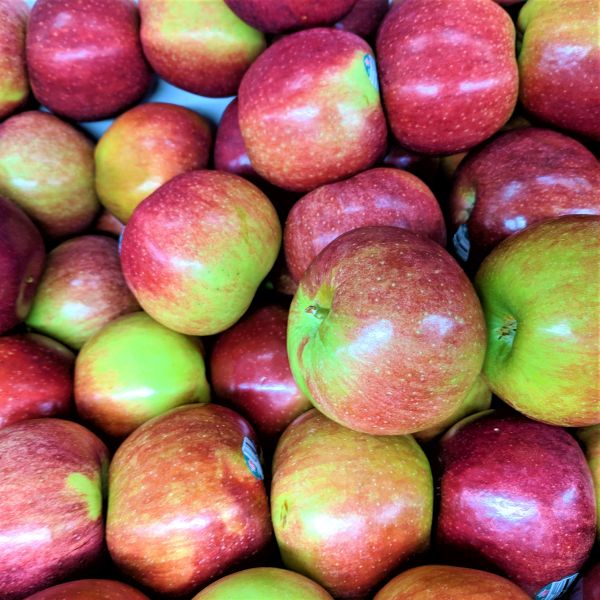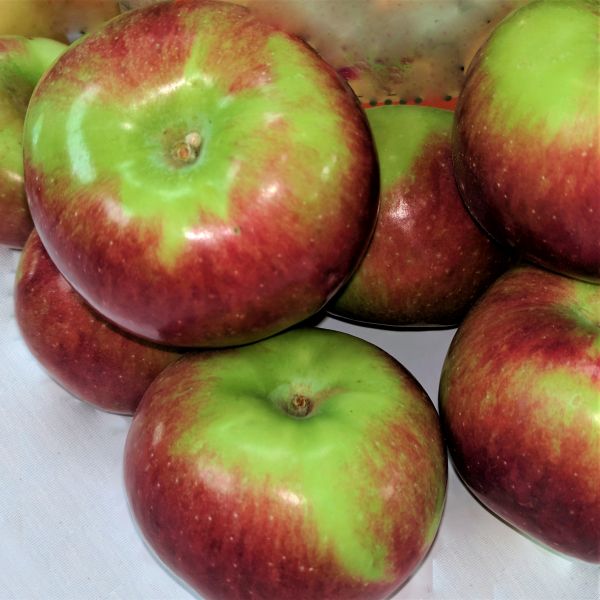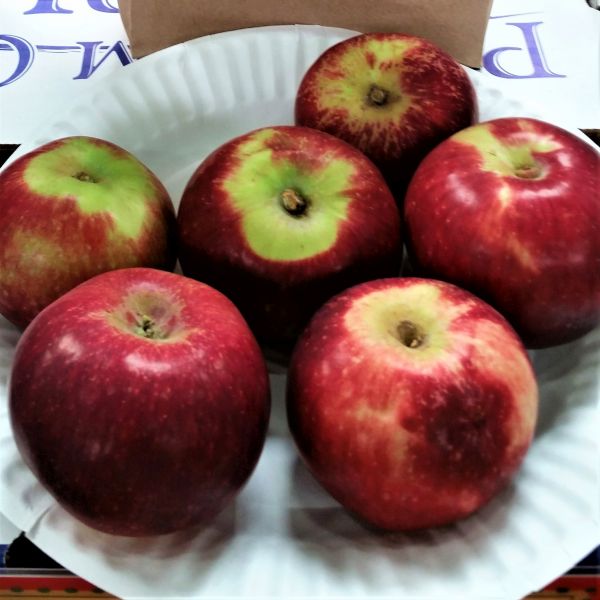Macoun Apple Tree
Malus 'Macoun'
Planting & Care
Planting & Care
Delivery and Shipping
Delivery and Shipping
Preorder Shipping Schedule
We ship your plants when it's safe to transport them to your zone. Dates are estimated and subject to weather delays.
| Zone 3-4 | Week of March 30th |
| Zone 5 | Week of March 16th |
| Zone 6 | Week of March 2nd |
| Zone 7-12 | Week of February 23rd |
Shipping Rates
Ships in 3-4 business days • Tracking provided • Weather protected
| Under $50 | $9.99 |
| $50 - $99.99 | $14.99 |
| $100 - $149.99 | $16.99 |
| $150 - $198.99 | $24.99 |
| $199+ | FREE |
✓ Zone-specific timing • ✓ Professional packaging • ✓ Health guarantee

Plant Sentry™ Protected
Your order is protected by our compliance system that:
- Prevents restricted plants from shipping to your state
- Ensures plants meet your state's agricultural requirements
- Protects gardens from invasive pests and diseases
Delicious Roadside Stand Quality Macoun Apple Tree!
- Dessert Apple with Exceptional Honeyed Berry Taste
- Juicy Snow-White Flesh
- Fragrant Flower-Like, Spicy Sweet-Tart Flavor
- Deep-Wine Red Skin
- Semi-Dwarf Lush Green Foliage
- Late Season Harvest
- Beloved Roadside Stand Apple
- Great Fresh Eating, Sauces & Baking
- Pink Buds Open to Fragrant White Blooms
- Pollinators Galore
- 600 Chill Hours
- Very Cold Hardy
People drive hundreds of miles to buy luscious Macoun Apples (Malus 'Macoun') at roadside stands. They are famous for their delicious dessert qualities.
Fragrant, great texture and a complex mix of spicy, sweet and tart make them a real favorite. Macoun Apples (Malus 'Macoun') are in high demand as products sold at roadside stands and pick-your-own orchards; now, you can grow your very own in your backyard.
A brilliant dark red-wine colored apple with a contrasting creamy white interior, these are fantastically flavorful fruit! Wonderful eaten straight from the tree, you can use them in salads and fruit cups. Macoun also stands up to baking and remains firm. Try them in a pie, crisp, or tarts that make your family happy.
Its delicious floral flavor also is great for making apple juice and applesauce. We like mixing them with other apple varieties to complement the full flavor spectrum.
How wonderful to pluck a delicious apple right off the branch while enjoying a warm day in your garden, and take a big, juicy bite, savoring its honeyed sweetness. The white, firm, juicy flesh has extremely high-quality sweetness and tart flavor.
How to Use Macoun Apple In The Landscape
People say the taste of the Macoun is better than any other apple. Why not grow your own?
The Macoun Apple tree itself grows upright and blooms mid-late season. It's a great pollinator partner, and pollinates early-blooming Apple trees, as well as ones blooming mid-season and late in the season!
Smaller-sized tree, Macoun make perfect dual-purpose edible landscaping trees, beautiful front garden specimen plants as they are patio shade and accent trees!
The blooms alone make these a tree you’d want to highlight this tree as a focal point. Lovely rows for property definition and privacy.
Small enough for urban yards and small orchards, as well as tucking into an existing orchard for an extension of the harvest season.
#ProPlantTips For Care
Fruit trees thrive in the full sun, you’ll get the largest crops and blooms in 8 plus hours of sunlight.
Hardy in growing zones 4-7, these are cold-tolerant trees! Developing the best flavor after some cool autumn nights, Macoun prefers colder growing zones.
A cross between McIntosh and Jersey Black apples they are heavy producers that should be thinned early in the season. You'll want the largest, highest quality apples to ripen for you. Thinning also helps your tree produce a consistent crop each year.
Though the tree is adaptable and can thrive in many soil types, your planting site will need to have good air circulation, well-drained soil and full sunlight.
Keep to a regular watering schedule and do not allow it to dry out during drought. Protect your investment with consistent, average moisture and a layer of mulch to insulate the roots and retain moisture.
Since the Macoun Apple is a late harvest fruit, it extends your harvest when planted with early ripening Apple selections such as Honeycrisp, mid-season McIntosh, and end-season Fuji, ensuring you’ll have nearly 5 months of fresh Apples to sell at your roadside stand or to just enjoy on your own in your garden.
Don’t miss out on this unique and flavorful fruit of Macoun Apple Tree! Order today, because Nature Hills sells out of this popular Apple Tree quickly!
Macoun Apple Tree Frequently Asked Questions
When to Plant Macoun Apple Trees
Planting Bareroot trees as soon as you can dig a hole in spring and until hot weather, the earlier the better. Plant container Apple trees throughout the growing season with complete success - that is the benefit of container plants - to extend the planting season. Your County Agricultural Extension Office is a great resource for first and last frost dates in your area.
How to Plant Macoun Apple Trees
Dig a large hole only as deep as needed to accommodate the bareroot or container root ball, and twice as wide. Add Nature Hills Root Booster to speed root establishment. Remove the pot or bag and situate it into the hole so the top of the soil (soil line if bareroot), is level with the new location's soil being careful not to plant too deep. Water in again very well and backfill with the same soil you dug up, tamping down gently to ensure there are no air pockets.
Top off with a 3-4 inch thick layer of Arborist mulch. Consider staking your tree to keep its trunk growing straight for the first year to ensure it stands tall against strong winds and drifting snow.
When to Prune Macoun Apple Trees
Trim off any broken branches from delivery as soon as you take them out of the box. Prune and trim apple trees while dormant, in late winter or early spring, before you see new growth.
How to Prune Macoun Apple Trees
Dormant prune to:
- Remove any double leaders or narrow crotch angles
- Eliminate any crossing branches
- Thin interior branching and leave the fruiting spurs and strong branches in place opening up the canopy
- Branching at least 24-36 inches above the ground
Prune Apple trees in the summer to:
- Control size and shape by reducing the length of longer new growth on vigorous trees
- Remove water sprouts on the main trunk or older branches in the crown
- Remove suckers at the base of the trunk
- Thin fruit during heavy years on established trees
How to Care for Macoun Apple Trees
Growing an apple tree is easy when proper soil, good drainage, attention to moisture, and regular fertility are maintained. Once you've chosen an apple tree that works for your climate, in the size you need for your landscape, and its pollinator (if needed), then you've accomplished half the battle!
- Apple trees do best in full sun and well-drained soil
- Water your apple trees when it gets dry - especially during the fruit production stage, and drought periods to keep it stress-free
- Use arborists' wood chips to mulch over the roots of your apples and have your soil tested to see what your soil may be lacking before adding fertilizers
- Maintenance pruning and shaping
Apple trees will tolerate a wide range of soils, so long as water and nutrients are not limited and the pH level is adequate.
How to Fertilize Macoun Apple Trees
For the first year, water alone is most important. It is always best to get a soil test to see what your soil is lacking before adding more fertilizers. Once established, a fertilizer routine may be beneficial. We do offer some excellent slow-release organic options, applied according to the package directions.
Fruit trees need more phosphate and it's possible to apply too much nitrogen which affects the soil's pH. Test soil acidity or alkalinity using a pH Tester.
Fertilize in spring when you first see new growth emerging.
- Don't overdo it
- Phosphates are your friends
- Pay attention to pH in areas with extremely high or low soil pH
- Follow the directions
Macoun Apple Tree Pollinating Info
Macoun is not self-fruiting and needs a pollinating partner. Pair with one of these varieties:
Harvest Times for Macoun Apple Trees
Macoun’s are typically ready to harvest in October.
Early-Season? Mid-Season? Late-Season? The terminology can be confusing for new apple tree growers. Weather, climate and your tree determine when it's ripe.
For Apples:
- Early-season is usually June-July
- Mid-season can be August-September
- Late-season can be from late September-November
The growing season consists of spring, summer, and fall, and varies with climate and weather. Areas with longer growing seasons in the warmer hardiness zones can greatly affect the harvest times for each particular apple variety grown in your area.
-
Botanical Name
-
Growing Zones
-
Height
-
Width
-
Sunlight
-
Growth RateModerate
-
Flower Color
-
Leaf Color
-
Fall Color
-
FragrantYes
-
Bloom PeriodLate Spring
-
Does Not Ship ToAK, HI, ID, MT
